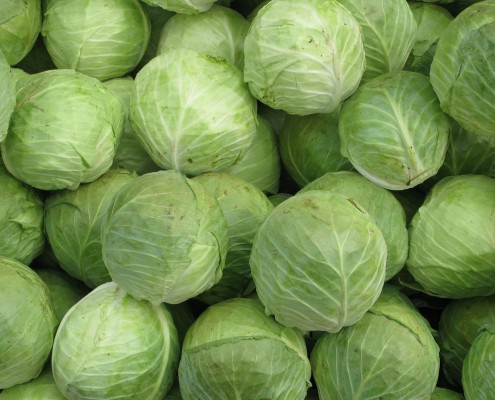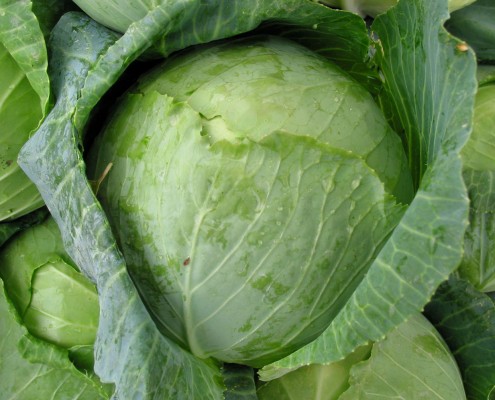Cabbage is a good source of vitamin K, vitamin C and fiber.
Cabbage is also an excellent source of manganese, vitamin B6, and folate; and a good source of thiamin, riboflavin, calcium, potassium, vitamin A, tryptophan, protein, and magnesium. Studies suggest that it, as well as other cruciferous vegetables, may reduce the risk of some cancers, especially those in the collector group.[81] This is possibly due to the glucosinolates found in cole crops, which stimulate the production of detoxifying enzymes that remove carcinogens created during metabolism,[82] or due to the sulphoraphane content, also responsible for metabolic anti-carcinogenic activities.
Purple cabbage also contains anthocyanins, which in other vegetables have been shown to have anti-carcinogenic properties. Along with other cole crops, cabbage is a source of indole-3-carbinol, a chemical that boosts DNA repair in cells and has been shown—in experiments using cell cultures and animal models—to block the growth of cancer cells.[ Research suggests that boiling these vegetables reduces their anti-carcinogenic properties.
Food-Borne Illness
Cabbage has been linked to outbreaks of some food-borne illnesses, including Listeria monocytogenes and Clostridium botulinum. The latter toxin has been traced to pre-made, packaged coleslaw mixes, while the spores were found on whole cabbages that were otherwise acceptable in appearance. Shigella species are able to survive in shredded cabbage. Two outbreaks of E. coli in the United States have been linked to cabbage consumption. Biological risk assessments have concluded that there is the potential for further outbreaks linked to uncooked cabbage, due to contamination at many stages of the growing, harvesting and packaging processes. Contaminants from water, humans, animals and soil have the potential to be transferred to cabbage, and from there to the end consumer.
Medicinal lore
In addition to its usual purpose as an edible vegetable, cabbage has been used historically as a medicinal herb for a variety of purported health benefits. The Ancient Greeks recommended consuming the vegetable as a laxative, and used cabbage juice as an antidote for mushroom poisoning, for eye salves, and for liniments used to help bruises heal. In Cato the Elder’s work De Agri Cultura (“On Agriculture”), he suggested that women could prevent diseases by bathing in urine obtained from those who had frequently eaten cabbage. The ancient Roman nobleman Pliny the Elder described both culinary and medicinal properties of the vegetable, recommending it for drunkenness—both preventatively to counter the effects of alcohol, and to cure hangovers. Similarly, the Ancient Egyptians ate cooked cabbage at the beginning of meals to reduce the intoxicating effects of wine. This traditional usage persisted in European literature until the mid-20th century.


